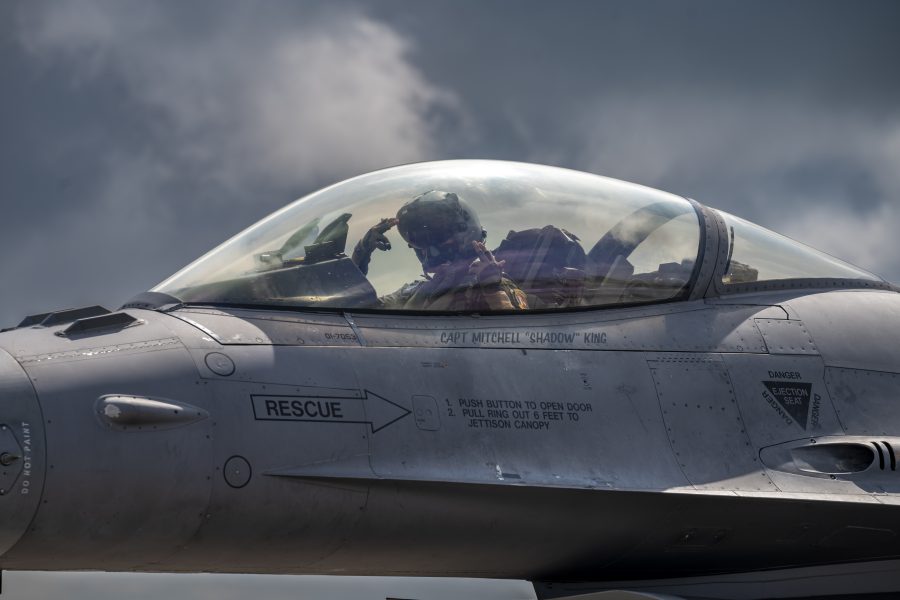Editor’s Note: This story was updated Aug. 21 to clarify details regarding the Assignment of Preference requirements.
The Air Force’s Rated Officer Retention Demonstration Program, announced Aug. 15, will offer pilots assignment preferences in addition to monetary bonuses, a service spokeswoman told Air & Space Forces Magazine on Aug. 18.
Pilots will have to sign at least an eight-year contract to receive the highest possible financial payout, and most command and control/intelligence, surveillance, and reconnaissance pilots will be capped at $35,000 per year, compared to $50,000 for other pilots.
The extra details shed more light on a trial program the Air Force is trotting out to entice pilots to stay in the service and re-up their commitment years in advance. Eligible pilots have until Sept. 15 to apply.
The demonstration program was implemented in the 2023 National Defense Authorization Act, which gave the Secretary of the Air Force leeway to offer bonuses and preferred assignments to rated officers “whose continued service on active duty would be in the best interest of the Department of the Air Force” and who have between 1-3 years left on their initial service commitment—a key difference from the service’s existing Aviation Bonus program, which targets Airmen whose service commitment is expiring.
The law requires a minimum of four extra years in the service from officers who take advantage of the program. Contracts for bonuses and preferred assignments are signed separately, so Airmen who take advantage of both will incur at least six years of service—four from the bonus, two from the assignment of preference. Airmen who only receive an assignment of preference will incur four years.
“[Assignment of preference] is worked directly between assignment officers and members, but may not be a good fit for all individuals based on career timing, etc.,” service spokeswoman Laurel Falls said, noting that assignment lengths will be standard, depending on the needs of the Air Force.
The level of bonuses will be determined based on the length of the contract signed and the Air Force’s needs for different specialties, Falls added.
Specifically, bomber pilots, fighter pilots, special operations pilots, rescue pilots, mobility pilots, and U-2 pilots will all be eligible for bonuses between $35,000 and $50,000:
- Four-year contracts come with $35,000 per year
- Five-to-seven-year contracts come with $42,500 per year
- Eight-to-12-year contracts come with $50,000 per year
Alternatively, those pilots can take a lump sum payment instead of annual payments:
- Five-to-seven-year contracts come with a lump sum of $100,000
- Eight-to-12-year contracts come with a lump sum of $200,000
For C2/ISR pilots, all contracts from four to 12 years come with annual payments of $35,000. Lump sum payments, however, are split between $100,000 for five-to-seven-year deals and $200,000 for eight to 12 years.
The demonstration program was implemented in the 2023 National Defense Authorization Act, which gave the Secretary of the Air Force leeway to offer the bonus to rated officers “whose continued service on active duty would be in the best interest of the Department of the Air Force” and who have between 1-3 years left on their initial service commitment—a key difference from the service’s existing Aviation Bonus program, which targets Airmen whose service commitment is expiring.
For this year, the program will be for Airmen whose Active-Duty service commitments from training are due to expire in fiscal 2024 and 2025. Moving forward, the Air Force will reserve the biggest bonuses for pilots who sign contracts while still having three years left on their initial commitment.
The program is authorized to run through 2028. If this initial year is deemed a success, the Air Force “may potentially continue with higher funding allocation requests in future years to expand offerings to a broader rated field and/or for an extended period,” according to a release.
Air Force leaders and members of Congress hope that providing pilots the chance to renew their commitment years in advance will address a common complaint among aviators—a lack of stability for their families.
In the past, Vice Chief of Staff Gen. David W. Allvin noted before Congress in May, bonuses have come too late to change plans that were already years in the making.
“Now, obviously, we’re asking for a longer commitment, but at that time, it’s helping them cement their future, see where their families are and have that predictability,” Allvin said.
Improving retention will be a key part in addressing the service’s persistent pilot shortage. In written testimony, Allvin noted that the Air Force had a net loss of about 250 pilots in fiscal 2022 and ended the year 1,900 pilots short of its goal of 21,000. For years now, the Air Force has struggled to produce and retain enough pilots to meet its goals, facing stiff competition from private industry.
